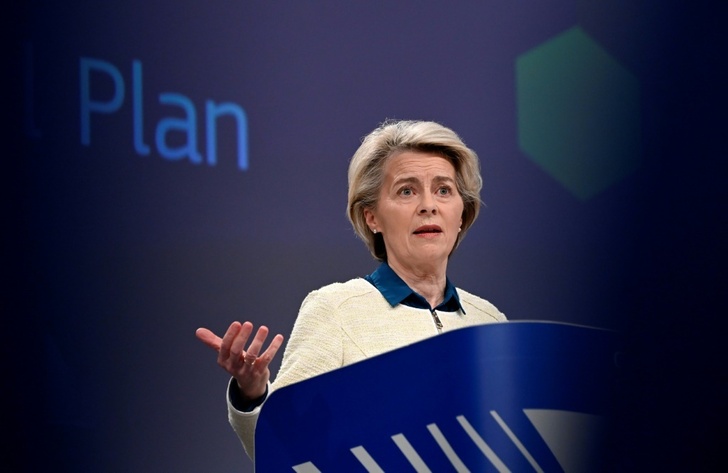The EU on Wednesday unveiled proposals including a controversial expansion of state aid rules to counter the threat to European industry from US green subsidies and unfair competition from China.
The bloc is racing to compete with the United States and China to avoid businesses relocating to Asia or North America where energy costs are cheaper, but EU member states are divided on how to respond.
European Commission President Ursula von der Leyen outlined the bloc's proposals, welcomed by France and Germany, but said there would be no immediate new EU funding.
"At the moment ... we need to work with what we have right now. And focus it on the clean tech industry," she said.
The majority of the EU response involves repackaging already existing funds, a stop-gap measure that has earned much criticism.
Von der Leyen left the door open to a new EU sovereignty fund being created in the future.
But that idea has already been strongly opposed by some member states including Denmark, Finland and the Netherlands which oppose throwing new money at the problem, or boosting borrowing to resolve it.
"If you have state aid, the other side of the coin has to be funding at the EU level," von der Leyen told a news conference.
The new measures give flexibility on providing aid to companies in the green and renewable energy sector and those involved in the decarbonisation of industry.
There will also tax benefits available for investments in production facilities in defined, strategic net-zero sectors.
- Dialogue with US -
The proposals are a response to a landmark US spending bill last year that funnels $370 billion into subsidies for America's energy transition -- including tax cuts for US-made electric cars and batteries, which has left European manufacturers dismayed.
European countries are unnerved by parts of the Inflation Reduction Act (IRA) which offers lavish advantages for US purchasers of electric vehicles if they "Buy American".
The EU response was worked out against a backdrop of disagreement among member states on how best to protect Europe's businesses, and fears of triggering a trade war.

The EU's competition chief Margrethe Vestager however insisted the bloc would act carefully and the relaxation of state aid rules would be "temporary, well targeted".
"Any action we take must preserve the integrity of our single market," she said.
Germany's Economy Minister Robert Habeck said the plan was "very good" and French counterpart Bruno Le Maire welcomed the "strong proposals".
The two ministers will go to Washington on February 7 to "discuss the IRA's impact on European industry," a French economy ministry source said Wednesday.
Germany and France represent respectively 53 and 24 percent of state aid notified to Brussels since March 2022 when the rules were relaxed following the war in Ukraine.
The EU is pushing the United States to make exemptions for European companies. But a special joint taskforce set up to address Brussels' concerns has yielded little fruit.
- 'Predictably disappointing' -
EU leaders will discuss the proposals at a summit in Brussels next week, and final decisions on the bloc's response are expected in March.
German MEP Markus Ferber described Wednesday's proposals as "old wine in new bottles" and "predictably disappointing".
Von der Leyen last month slammed "aggressive attempts" by China to persuade Europe's clean technology companies to relocate and take advantage of its cheaper labour and more lenient regulations.
Environmentalists criticised the EU's plan, saying the measures did not go far enough.
"Green subsidies are good but not enough to have a meaningful effect on climate," said Luke Haywood, head of climate policy at the European Environmental Bureau.
"Without cutting fossil fuel subsidies, pricing carbon properly and introducing measures to reduce demand, these financial efforts will be toothless."
burs-raz/rmb/bp
© Agence France-Presse
Your content is great. However, if any of the content contained herein violates any rights of yours, including those of copyright, please contact us immediately by e-mail at media[@]kissrpr.com.
Source: Story.KISSPR.com

